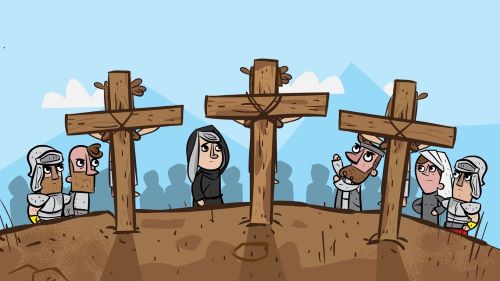By Olatokunbo Odunuga
I once wrote on the poser: was our Lord crucified on Friday or on Wednesday? We showed from scriptures that on the week that our Lord was crucified, two Sabbaths coincided- the special Annual Sabbath and the regular Weekly Sabbath on Saturdays. Coming to grips with this duality was what had thrown believers into age-long confusion about the three days and three nights.
It also dawned on us that for our Lord to have been three days and three nights in the grave just as Jonah was in the belly of the whale, He could not have been crucified on Friday, buried in the evening, and rose up before early morning on Sunday. The obvious fact, therefore, is the He was crucified and buried on Wednesday evening.
Easter Sunday is here. But please let me give us a slight gentle jolt at the onset for free, no offerings are required! The word “Easter” would not be found in any accurate Bible. Its appearance in Acts 12: 4 in KJV of 1611 was translators’ error! It had been corrected in NKJV and all the other 12 revisions of the KJV including the most current revision International KJV [ IKJV ] of 2011.
2.0 Easter may sound like Esther, but they have nothing in common. Esther was a queen who did not keep silent at such a time when she and her father’s house would have perished in Babylon. We need such ‘Esthers’ and their male counterparts who would not be docile and indifferent in time like this when a world-renowned evangelist recently admitted on the Media that the Church is deluded.
I want to add that, it is not only deluded as that man of God concluded, but to some extent deceived and essentially brain-washed especially where Mammon is involved. Easter is a religious season that draws a lot of activities and festivities. From the research of some accredited and creditable scholars, it may not be inappropriate to draw the conclusion that the celebration of Easter is not authenticated by the Holy Bible.
As mentioned earlier, the inclusion of Easter in Acts 12:4 in the King James Version of the Bible was an inadvertence. In fact, Rev. Finis Dake called it an absurd and unfortunate translation.
3.0 There are presently over 1,200 versions of the Bible and I may not be mistaken if I mention that about 99% of these versions have removed the word “Easter” and replaced it with the appropriate word, i.e. “Passover”. These reviewers are objective and sincere, not narrow-minded people.
If one checks the commentary on Acts 12: 4 on page 137 of Dake Annotated Bible, it reads: “Easter is a pagan festival observed long before Christ. It is not a Christian name but came into being from Ishtar, and among the Babylonian titles of the Queen Ashtoreth whose worship was detested by God (1 Kings 5:33; 2 Kings 23:13;1 Samuel 7:3)”.
Rev. Finis Dake further drew attention to the fact that “Christmas, Lent, Easter, etc were borrowed from Babylon and were celebrated hundreds of years before Christ and that they have no bearing with Christianity or Jesus Christ” Unquote. Fuller details can be read in item (b), column 1, page 137 (N.T.) of Dake Annotated Bible.
4.0 According to Encyclopedia Britannica, “The English name Easter is of uncertain origin; the Anglo-Saxon priest, Venerable John Bede in the 8th century derived it from the Anglo-Saxon spring goddess, Eostre. There is no indication of the Easter festival in the New Testament or in the writings of the apostolic fathers. The sanctity of special times was an idea absent from the minds of the first Christians…Neither the Lord nor his apostles enjoined the keeping of this or any other festival ” Unquote.
I had glanced through my copy of the DIDACHE written in the first century and there are no hints concerning the observances of Easter therein. Others link it to Astarte, the Phoenician’s fertility goddess who had the Babylonian counterpart, Ishtar. The American Book of Days stated, “There is no doubt that the Church in its early days adopted the pagan customs and gave a Christian meaning to them”.
5.0 As a contribution, the book-Medieval Holiday and Festivals, states, “The holiday is named after the pagan goddess of the Dawn and of the Spring, Eostre”. And who was this goddess Eostre? “It was she who, according to legend, opened the portals of Valhalla, to receive Baldur, called the white god, because of his purity and also the Sun God, because his brow supplied light to mankind” was the response of the American Book of Days.


1 comment
[…] Read part one of this article. Follow this link:https://churchtimesnigeria.net/easter-goddess-esther/ […]